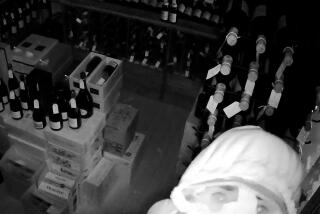Wine fraudster Rudy Kurniawan, once an L.A. name, gets 10 years
- Share via
Reporting from New York — Rudy Kurniawan, a onetime darling of the fine wine scene who became famous for buying and selling bottles from some of the world’s great vintages, was sentenced Thursday to 10 years in prison for duping collectors with grape-colored concoctions created in his Los Angeles-area home.
Kurniawan, 37, stood quietly in federal court in Manhattan, his head slightly bowed, as Judge Richard Berman rejected a defense request that Kurniawan be sentenced to time already served. Kurniawan has been in prison since his arrest in March 2012 following a raid on his Arcadia home that turned up thousands of empty bottles, corks, fake labels, sealing wax and other evidence of a wine-counterfeiting operation.
The lengthy sentencing hearing, which lasted about three hours, was as much a discussion of how much time Kurniawan should serve as a debate over whether his victims’ extraordinary wealth diminished the gravity of the crime.
“Nobody died. Nobody lost their savings. Nobody lost their job,” defense attorney Jerome Mooney said, describing wine collecting as “more of a hobby” enjoyed by the 1%. Comparing Kurniawan’s fraud to other economic crimes, Mooney said: “The money that was lost in those cases was money that was dearly needed ... this case is entirely different.”
Prosecutor Stanley Okula called Mooney’s argument “quite shocking.”
“Fraud is fraud,” Okula said, describing Kurniawan as “the kingpin of counterfeiters.”
“He did it to line his own pockets,” said Okula, who had asked for up to 135 months in prison.
A jury convicted Kurniawan last December of two counts of fraud related to the sale of wines to individuals, auctioneers and other wine dealers, many of which were alleged to have been fakes put in bottles and passed off as the real thing.
The case landed in New York because one of the fraud charges against Kurniawan specifically referred to a loan he was accused of obtaining under false pretenses from a New York-based financing company.
In addition to the prison time, Kurniawan was ordered to forfeit $20 million and to pay $28.4 million to victims.
Those duped into buying fake wines included billionaire William Koch. Koch filed a lawsuit against Kurniawan in California in 2009 alleging he had spent more than $2 million on wines consigned by Kurniawan that he believed to be fake. Koch and Kurniawan settled that lawsuit last month.
Mooney made a lengthy appeal for lenience, portraying his client as a deeply insecure man who loved good wine and yearned to be accepted into the world of the rich collectors who buy it, sell it and drink it at lavish dinner parties.
“He wanted to be a part of it,” Mooney said of Kurniawan, who burst onto the Los Angeles wine scene in his early 20s after getting his first taste of a great wine.
Using family wealth, Kurniawan began buying up wine, offering it for auction, and bringing bottles worth thousands of dollars each to dinners to share with other collectors.
The more Kurniawan provided, the more his fans wanted, said Mooney. “He began faking it to meet the demand,” Mooney said, insisting he was not motivated by greed but by a desire to please his circle of friends.
Kurniawan was given a chance to speak. In a barely audible voice, he stood and told Berman: “Your honor, I’m really sorry.”
Berman was not convinced.
“What is he so sorry about?” Berman said of Kurniawan, adding that the defendant had not specifically admitted what he had done wrong. “I think this was a very serious economic fraud or con.”
Kurniawan, an Indonesian who entered the United States when he was 16 on a student visa, has been in the country illegally for more than 10 years after being denied political asylum. He faces deportation when he is released from prison.
Berman did grant Mooney’s request that he recommend Kurniawan serve his time at a prison in Southern California so he can be close to his mother.
“I wish you, Mr. Kurniawan, the very best of luck,” he said as Kurniawan was led out of court.
Mooney said he will “almost certainly” appeal.
Follow @TinaSusman for national news
More to Read
Sign up for Essential California
The most important California stories and recommendations in your inbox every morning.
You may occasionally receive promotional content from the Los Angeles Times.










